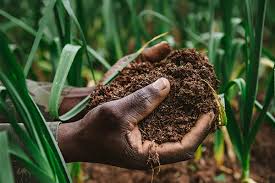By Doris Esa
The Federal Government has announced plans to promote all-year-round farming as part of efforts to boost food production across the country.
The Minister of State for Agriculture and Food Security, Sen. Aliyu Abdullahi, stated this in Abuja at a ministerial news conference to mark the 2025 World Food Day.
The theme is “Hand in Hand for Better Food and a Better Future”.
Abdullahi said the 2025 Wet Season Agricultural Performance Survey confirmed steady growth in Nigeria’s agricultural output, especially in rice, maize, sorghum, millet, cowpea, yam, and cassava production.
He said all the crops recorded higher yields compared to 2024, attributing the gains to modest expansion in cultivated areas, improved farming practices, and resilience among farmers across major producing states.
“These gains have reinforced food security and sustained agro-industrial value chains,” the minister said.
He added that the government had commenced a Dry Season Initiative to ensure all-year-round farming on 500,000 hectares of land.
“The first phase focused on wheat production in 15 wheat-producing states, while the second phase covers rice, maize, and cassava,” he said.
Abdullahi said the government was also scaling up industrial transformation in the agriculture sector through the rollout of Special Agro-Industrial Processing Zones (SAPZ), supported by the African Development Bank and other development partners.
He said the first phase of the five-year SAPZ programme covers Kaduna, Cross River, Kano, Kwara, Imo, Ogun, Oyo, and the FCT, adding that implementation had already commenced in Kaduna and Cross River States in April 2025.
According to him, the programme aims to boost agricultural output by over 60 per cent, reduce post-harvest losses by 80 per cent, promote value addition, create jobs, and improve market access.
“Through the SAPZ project, Nigeria aims to accelerate its shift towards an agro-industrial economy and support broader national diversification efforts,” Abdullahi said.
He added that the government had also unveiled a plan to strengthen the National Strategic Food Reserve to ensure adequate stockpiling of essential commodities.
“This measure will help prevent crises arising from acute food shortages and reduce dependence on imports,” he said.
The minister explained that the strategic food reserve would help stabilise food prices, ensure steady supply of essential commodities, and protect both consumers and farmers from extreme market fluctuations.
In his remarks, the Minister of Livestock Development, Alhaji Idi Maiha, said the establishment of the Livestock Ministry was to transform the sub-sector into a modern, economically viable industry.
“We are here to synergise and partner with the Ministry of Agriculture because our efforts are complementary,” Maiha said.
The News Agency of Nigeria (NAN) reports that farm inputs such as sprayers, organic fertilisers, and water pumps were distributed to women farmers’ organisations and young farmers’ clubs in schools.
They were also given to farmers’ cooperatives during the event. (NAN) (www.nannews.ng)
Edited by Tosin Kolade












